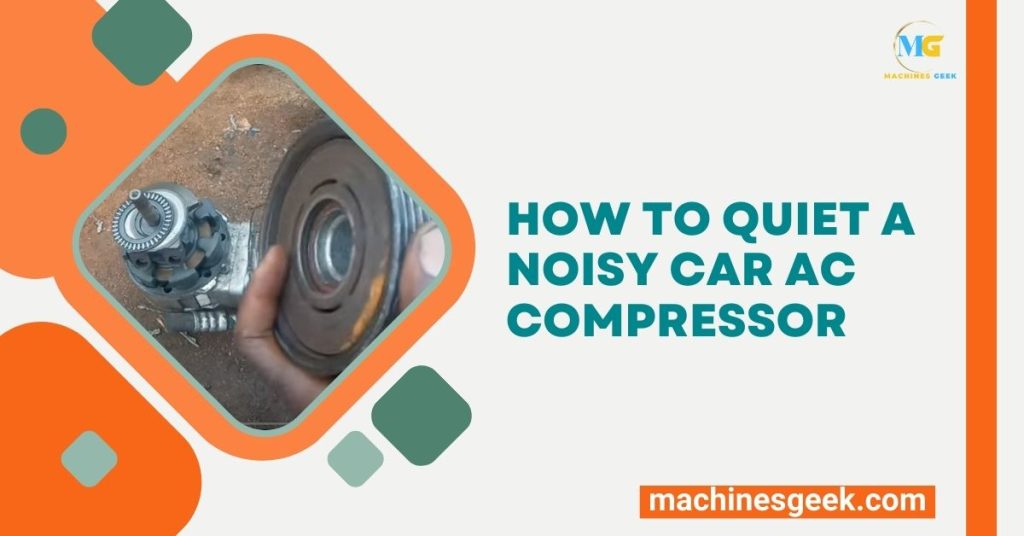How to Quiet a Noisy Car AC Compressor? To quiet a noisy car AC compressor, professionals recommend checking and replacing worn-out compressor parts. Noisy car AC compressors can be a bothersome and distracting issue for drivers.
The constant rattling and humming sounds can make drives uncomfortable and affect the overall performance of the vehicle. Fortunately, there are a few simple steps you can take to tackle this problem. This article will explore some effective methods to quiet a noisy car AC compressor, allowing you to enjoy a peaceful and smooth driving experience.
By adhering to some expert advice, you can identify and resolve the issue, ensuring your car’s AC system functions optimally and silently. So, let’s dive into the techniques that can help you eliminate the noisy annoyance of a car AC compressor.
The Noises From Your Car AC Compressor
When it comes to your car’s AC compressor, it’s important to be able to distinguish between normal sounds and abnormal noises. Understanding the noises that your car’s AC compressor can make will help you identify any potential issues before they become major problems.
Differentiating Normal Ac Compressor Sounds From Abnormal Noises
Normal sounds from your car’s AC compressor may include a slight hum or a low-level whirring noise. These sounds are typically heard when the AC is running and are usually not cause for concern. However, abnormal noises indicate that there may be a problem with the AC compressor that needs to be addressed.
Common Noises Associated With A Faulty Ac Compressor
A faulty AC compressor can produce various noises that can signal an underlying problem. Here are some common noises associated with a faulty AC compressor:
- Loud banging or clanking sounds: These sounds can indicate a loose or damaged component within the AC compressor, such as a broken piston.
- Squealing or squeaking noises: These noises may suggest a worn-out or misaligned AC compressor belt. It’s important to address this issue promptly to prevent further damage.
- Clicking or ticking sounds: If you hear repeated clicking or ticking noises coming from the AC compressor, it could be a sign of a faulty relay switch or a failing solenoid.
- Hissing or buzzing sounds: These sounds may indicate a refrigerant leak, which can lead to inadequate cooling and even compromise the overall performance of your AC system.
Identifying The Specific Noise Coming From Your Car’s AC Compressor
To identify the specific noise coming from your car’s AC compressor, it’s essential to listen carefully and pinpoint the origin of the sound. Here’s a step-by-step guide to help you:
- Listen closely to the noise and pay attention to when it occurs. Is it only present when the AC is turned on, or does it persist even when the AC is off?
- Try to locate the source of the noise. Is it coming from the AC compressor itself, or does it seem to be originating from a different part of the system?
- Note any additional factors that may be related to the noise, such as changes in the air temperature or airflow. This information can help a professional diagnose the issue more accurately.
By understanding the noises that your car’s AC compressor can make, you’ll be better equipped to identify any potential problems and take appropriate action. Remember, if you’re unsure about any noises or suspect a problem with your AC compressor, it’s always best to consult a qualified mechanic who can diagnose and resolve the issue.
Troubleshooting And Diagnosing The Issue
If you’ve noticed that your car’s AC compressor is making an unusual amount of noise, it’s important to address the issue promptly. A noisy AC compressor can not only be annoying, but it can also indicate a potential problem that could lead to further damage if left unchecked.
In this section, we will discuss the steps you can take to troubleshoot and diagnose the issue with your car’s AC compressor. By following these steps, you can identify the underlying problem and take the necessary measures to quiet the noisy compressor.
Inspecting The AC compressor For Visible Signs Of Damage Or Wear
Inspecting the AC compressor for visible signs of damage or wear is an essential first step in troubleshooting a noisy AC compressor. By visually examining the compressor, you can identify any obvious issues that may be contributing to the noise. Here are some key points to consider when inspecting the AC compressor:
- Look for signs of leaks or oil drips around the compressor. Oil leaks can indicate a faulty seal or gasket, which may be causing the noise.
- Check for loose or damaged mounting bolts. If the compressor is not securely fastened, it may vibrate and produce noise.
- Inspect the electrical connections to ensure they are tight and free from corrosion. Loose or corroded connections can result in a noisy compressor.
Checking The AC compressor Belt For Looseness Or Cracks
The AC compressor belt plays a crucial role in the operation of the compressor. A loose or worn-out belt can cause the compressor to make noise. Here’s how to check the AC compressor belt:
- Start by turning off your car’s engine and allowing it to cool for a few minutes.
- Locate the AC compressor belt. Consult your car’s manual if you’re unsure of its location.
- Inspect the belt for signs of looseness or cracks. A loose belt may need to be tightened, while a cracked belt should be replaced.
- If the belt needs to be tightened, locate the tensioner pulley and use a wrench to adjust the tension until the belt has the correct amount of slack.
Conducting A Pressure Test To Determine If The Compressor Is Functioning Properly
Conducting a pressure test is an effective way to determine if your car’s AC compressor is functioning properly. Here’s how to conduct a pressure test:
- First, ensure that the AC system is charged with the correct amount of refrigerant. Low refrigerant levels can cause the compressor to make noise.
- Connect a pressure gauge to the low and high-pressure ports of the AC system.
- Start the engine and turn on the AC to the maximum setting.
- Observe the pressure readings on the gauge. If the pressure is below or above the manufacturer’s specifications, it may indicate a problem with the compressor.
- If the pressure is abnormal, it is recommended to have a professional inspect and service the AC system.
By following these troubleshooting steps and addressing any issues that are identified, you can effectively quiet a noisy car AC compressor. It’s important to remember that if the problem persists or if you are unsure about the troubleshooting process, it is always best to consult a professional mechanic who can provide accurate diagnosis and repair.
Replacing The AC compressor
Is your car’s AC compressor making too much noise? Learn how to quiet a noisy car AC compressor with these simple steps. Keep your ride peaceful and enjoyable by replacing the AC compressor effectively.
When it comes to quieting a noisy car AC compressor, sometimes the best solution is to replace the compressor altogether. Replacing the AC compressor can be a daunting task, but with the right guidance, it can be done by the average car owner. In this section, we will walk you through the steps to remove the old AC compressor from your car, discuss choosing a suitable replacement AC compressor, and guide you through the proper installation of the new AC compressor.
Steps To Remove The Old AC Compressor From Your Car
- Start by disconnecting the negative terminal of your car’s battery, ensuring safety throughout the process.
- Locate the AC compressor in your vehicle. Refer to your car’s manual or the manufacturer’s guidelines for its specific location as it can vary depending on the make and model.
- Once you have located the AC compressor, use a wrench or appropriate tool to loosen and remove the drive belt that connects the compressor to the engine.
- Next, carefully disconnect all electrical connections attached to the AC compressor. Pay close attention to the wiring harness and any sensors that may be connected to it.
- After disconnecting the electrical connections, remove the refrigerant lines connected to the AC compressor. Be cautious as refrigerant can be harmful, and it’s important to follow proper disposal procedures.
- Now that all connections have been removed, remove the mounting bolts securing the AC compressor to the car’s engine or frame. Keep track of the bolts as they will be needed for the installation of the new compressor.
- Once all the bolts are removed, carefully lift the old AC compressor out of its mounting position and set it aside.
Choosing A Suitable Replacement AC Compressor
When selecting a replacement AC compressor, it is crucial to choose one that is compatible with your vehicle’s make and model. Additionally, consider factors such as warranty, quality, and cost. Here are some steps to guide you in the process:
- Consult your car’s manual or an authorized dealer to determine the specific requirements for your replacement AC compressor.
- Research reputable manufacturers and suppliers are known for producing reliable AC compressors.
- Compare prices and warranties offered by different suppliers to ensure you are getting the best value for your money.
- Consider reading customer reviews or seeking recommendations from experienced mechanics or car enthusiasts to get insights into the performance and durability of various AC compressors.
Proper Installation Of The New AC compressor
Now that you have selected a suitable replacement AC compressor, it’s time to install it correctly to ensure optimal performance and quiet operation. Follow these steps for a proper installation:
- Place the new AC compressor into the mounting position previously occupied by the old compressor.
- Secure the compressor in place by tightening the mounting bolts to the manufacturer’s specifications.
- Reconnect the refrigerant lines, ensuring proper sealing and tight connections.
- Reattach the electrical connections, making sure they are securely plugged in and that all wiring harnesses are properly connected.
- Reinstall the drive belt, following the diagram or reference points on the engine to ensure correct placement and tension.
- Finally, reconnect the negative terminal of your car’s battery to restore power.
By following these steps, you can successfully replace your car’s noisy AC compressor, restoring a quieter and more comfortable driving experience. Remember to prioritize safety throughout the process and seek professional assistance if needed. Now that you know the steps involved, you can confidently tackle this task and enjoy a peaceful ride.
Proper Maintenance To Prevent Noisy AC Compressor
Regularly Checking And Replacing The AC compressor Oil
One of the crucial maintenance tasks to prevent a noisy AC compressor is to regularly check and replace the AC compressor oil. The AC compressor oil lubricates the components inside the compressor, reducing friction and preventing unnecessary noise. Over time, the oil can become dirty or depleted, affecting the compressor’s performance and causing it to make noise.
To ensure the AC compressor operates smoothly, follow these steps to check and replace the oil:
- Locate the AC compressor’s oil fill port.
- Remove the oil fill port cap and use a flashlight to inspect the oil level. The oil should be between the minimum and maximum marks on the dipstick.
- If the oil level is below the minimum mark, add the appropriate amount of compressor oil recommended by the manufacturer. Use a funnel to pour the oil slowly to prevent spills.
- If the oil appears dirty or contaminated, it is best to drain and replace it entirely. Refer to the vehicle’s manual or seek professional assistance to perform this task correctly.
By regularly checking and replacing the AC compressor oil, you can maintain optimal lubrication and reduce the chances of a noisy compressor.
Maintaining The Correct Refrigerant Level In Your Car’s AC system
Maintaining the correct refrigerant level is another essential maintenance task to prevent a noisy AC compressor. The refrigerant is responsible for absorbing and releasing heat, allowing the AC system to cool the air inside your vehicle. If the refrigerant level is low, the AC compressor can experience strain, causing it to make loud noises.
Here’s how you can ensure the correct refrigerant level in your car’s AC system:
- Before checking the refrigerant level, make sure the engine is turned off and the car is parked on a level surface.
- Locate the low-pressure port on the AC system. It is typically marked with an “L” or “LOW.”
- Attach a gauge or manifold set to the low-pressure port to measure the refrigerant level.
- If the gauge shows that the refrigerant level is below the manufacturer’s recommended range, it is best to recharge the AC system. This task requires specialized equipment and should be performed by a professional technician.
By maintaining the correct refrigerant level in your car’s AC system, you can ensure smooth operation and minimize the risk of a noisy compressor.
Keeping the AC compressor and its surrounding components clean is imperative for preventing a noisy AC compressor. Over time, dirt, debris, and grime can accumulate on the compressor, hindering its performance and causing unwanted noise.
Follow these steps to clean the AC compressor and surrounding components effectively:
- Ensure the engine and AC system are switched off before cleaning.
- Using a soft brush or cloth, gently remove any visible dirt and debris from the AC compressor and its housing.
- Pay attention to the fins and cooling fans of the compressor. They often accumulate dirt and can restrict airflow, leading to overheating and noise.
- For more thorough cleaning, use a specialized AC coil cleaner or mild detergent mixed with water. Apply the cleaner to the compressor using a spray bottle or a foam applicator.
- Allow the cleaner to penetrate the dirt for a few minutes, and then rinse off with water until all traces of the cleaner are gone.
- Ensure that the compressor and surrounding components are completely dry before turning on the AC system again.
Regularly cleaning the AC compressor and its surrounding components will improve airflow, reduce strain on the compressor, and help prevent noise from occurring.
Soundproofing Techniques For A Noisy Car AC Compressor
Is your car’s AC compressor making annoying and distracting noises? Fortunately, there are effective soundproofing techniques you can use to reduce the noise and enjoy a quieter ride. By implementing these strategies, you can create a more peaceful and comfortable driving experience.
In this article, we will explore three soundproofing techniques to quiet a noisy car AC compressor: using sound-dampening materials to reduce noise transmission, insulating the air conditioning hoses to minimize vibrations and noise, and installing a soundproofing enclosure around the AC compressor. Let’s delve into each technique in detail.
Using Sound-dampening Materials To Reduce Noise Transmission
One effective method to mitigate noise from your car’s AC compressor is by utilizing sound-dampening materials. These materials work by absorbing and isolating the sound waves produced by the AC compressor, preventing them from propagating throughout the vehicle’s cabin. Here are a few sound-dampening materials you can consider:
- Absorptive foams: These foams are designed to absorb and deaden sound vibrations. They can be applied to various areas around the AC compressor, such as the compressor housing, the firewall, and any other panels that are prone to noise transmission.
- Mass-loaded vinyl (MLV): MLV is a dense and flexible material that acts as a barrier to sound. It can be installed on the interior walls and floor of your vehicle, creating an additional layer of sound insulation.
- Noise-reducing mats: These mats are specifically designed to reduce noise transmission in vehicles. They can be placed on the engine hood, firewall, and other areas near the AC compressor to absorb sound waves.
Insulating The Air Conditioning Hoses To Minimize Vibrations And Noise
Another noise-reducing technique involves insulating the air conditioning hoses. The vibrations and noise generated by the AC compressor can travel through the hoses and into the cabin, causing disturbance. To minimize this problem, consider the following steps:
- Wrap the air conditioning hoses with specialized insulation sleeves or tapes. These materials help dampen vibrations and reduce noise.
- Ensure the insulation is properly secured and covers the entire length of the hoses.
- Use zip ties or clamps to fasten the insulation in place and prevent it from slipping or moving.
Installing A Soundproofing Enclosure Around The AC compressor
For a more comprehensive approach to noise reduction, consider installing a soundproofing enclosure around the AC compressor. This enclosure acts as a physical barrier, containing the noise within a confined space. Here’s how you can install a soundproofing enclosure:
- Measure the dimensions of your AC compressor.
- Construct an enclosure using sound-absorbing materials, such as mass-loaded vinyl or plywood.
- Ensure the enclosure is large enough to cover the entire AC compressor but leave enough space for proper ventilation.
- Install the enclosure around the AC compressor, making sure it is tightly sealed. Use seals or gaskets to minimize sound leakage.
By employing these soundproofing techniques, you can effectively reduce the noise generated by your car’s AC compressor and enjoy a much quieter driving experience. Whether you choose to use sound-dampening materials, insulate the air conditioning hoses, or install a soundproofing enclosure, remember to carefully follow the installation instructions and prioritize your safety. Say goodbye to those annoying AC compressor noises and embrace a peaceful ride!
Seeking Professional Help
If you want to quiet a noisy car AC compressor, it is recommended to seek professional help. Skilled technicians can diagnose and repair any issues, ensuring a quiet and efficient cooling system for your vehicle.
If you’ve been experiencing a noisy car AC compressor and the previously mentioned DIY fixes don’t seem to do the trick, it may be time to consult a certified mechanic for further assistance. While it can be tempting to try and handle all car repairs on your own, AC systems are complex and require specialized knowledge. In this section, we’ll explore when to consult a certified mechanic, how to verify their qualifications and reputation, as well as what you can expect during a professional diagnosis and repair.
When To Consult A Certified Mechanic For Assistance
Determining when it’s necessary to seek professional help with your noisy car AC compressor can save you time, money, and potential headaches. Here are a few indications that it’s time to consult a certified mechanic:
- If the noise persists even after attempting simple DIY fixes
- If the noise is accompanied by other AC system issues, such as weak cooling or strange odors
- If you’re unsure about diagnosing the specific cause of the noise
- If you lack the necessary tools or expertise to perform repairs
Verifying The Qualifications And Reputation Of An AC Repair Service
When selecting an AC repair service, it’s essential to ensure they are qualified and have a reputable background. Here’s what to consider before entrusting your car’s AC system to a particular professional:
- Check for certifications: Look for certifications from reputable organizations, such as the National Institute for Automotive Service Excellence (ASE), which indicate the mechanic’s expertise.
- Read reviews and testimonials: Take the time to read reviews and testimonials from previous customers to get an idea of the repair service’s reputation and customer satisfaction level.
- Ask for recommendations: Seek recommendations from trusted friends, family members, or online communities where car enthusiasts share their experiences.
- Consult local directories: Check local directories or online platforms that list reputable repair services and provide customer ratings and reviews.
- Request a quote: Reach out to the repair service and request a quote for the repair, ensuring they provide a detailed breakdown of the costs involved.
What To Expect During A Professional Diagnosis And Repair
When you bring your car to a certified mechanic for a noisy AC compressor, you can expect a thorough diagnosis and repair process. This typically involves the following steps:
- Inspection: The mechanic will inspect your car’s AC system to identify the specific cause of the noise. This may include checking the compressor, compressor pulley, belt tension, and other associated components.
- Diagnostics: Using specialized tools and equipment, the mechanic will perform diagnostics to pinpoint the source of the noise and determine if any other issues are present.
- Repair plan: Based on their findings, the mechanic will develop a repair plan tailored to address the root cause of the noise. They will provide you with a detailed explanation of the required repairs and associated costs.
- Professional repair: With your approval, the mechanic will proceed to carry out the necessary repairs on your car’s AC system using their expertise and specialized tools.
- Testing and verification: After the repairs are completed, the mechanic will test your car’s AC system to ensure the noise has been resolved and that it’s functioning optimally.
By seeking professional help for your noisy car AC compressor, you can ensure that your car’s AC system is diagnosed and repaired correctly, providing you with a quieter and efficient cooling experience. Remember to do your due diligence when choosing a certified mechanic, as it can greatly impact the quality of the repair service you receive.
Cost Estimates And Budgeting
When your car’s AC compressor starts making noise, it’s not just an annoyance but a potential sign of a bigger problem. Dealing with a noisy AC compressor may require repair or even replacement, and this can come with its own costs. Understanding the estimated costs involved and budgeting accordingly is essential to ensure a smooth AC compressor repair process.
Estimating The Overall Cost Of Repairing Or Replacing The Ac Compressor
Before embarking on any repairs, it’s important to have a clear picture of the potential costs. Estimating the overall cost of repairing or replacing the AC compressor will help you plan your budget and make informed decisions. The cost estimation may vary depending on several factors, which we will explore in the following section.
Factors That May Influence The Cost Of The Repair
The cost of repairing or replacing the AC compressor can be influenced by various factors. Being aware of these factors will give you a better understanding of why the costs may vary and help you budget more effectively. Here are some key factors to consider:
- Car make and model: The type of car you own can impact the cost. Luxury or imported vehicles often have more expensive AC compressor parts, which can increase the overall repair cost.
- AC compressor type: Different car models may have different types of AC compressors, such as variable displacement or fixed displacement compressors. The complexity of the compressor type can affect the repair cost.
- Extent of damage: The extent and nature of the damage to the AC compressor can vary. Minor repairs, such as replacing a faulty component, may be less expensive compared to the complete replacement of the compressor.
- Labor costs: Labor costs for repairs can vary depending on the repair shop and their hourly rates. It’s important to research and compare labor costs to ensure you are getting the best deal without compromising on quality.
- Additional parts required: Sometimes, other components may need replacement along with the AC compressor. These additional parts can add to the overall cost of the repair.
Tips For Budgeting And Managing Your Expenses In AC Compressor Repair
Managing your expenses during AC compressor repair is crucial to avoid any financial strain. By following these tips, you can budget more effectively and ensure a smooth repair process:
- Get multiple quotes: Obtain quotes from different repair shops to compare the costs and identify the best option for your budget.
- Consider warranties: If your car is still under warranty, check if the AC compressor repair is covered. This can help minimize costs.
- Plan for unexpected expenses: It’s always a good idea to set aside a small buffer in your budget for any unforeseen expenses that may arise during the repair process.
- Consider financing options: If the repair cost is substantial, explore financing options that may help you manage the expenses more comfortably.
- Regular AC maintenance: Preventive maintenance can help extend the lifespan of your AC compressor. Schedule regular check-ups and maintenance to avoid costly repairs in the future.
By estimating the costs involved, considering influencing factors, and employing budgeting strategies, you can confidently navigate the process of quieting a noisy car AC compressor without breaking the bank.
Frequently Asked Questions
How Do I Know If My Car’s AC Compressor Is Noisy?
If you hear loud grinding or rattling noises from your car’s AC compressor, it’s a sign of a problem. This noise usually indicates a failing compressor or a loose component. It’s important to have it checked as soon as possible to prevent further damage.
What Causes A Noisy Car AC Compressor?
There are several reasons why a car’s AC compressor becomes noisy. Common causes include a worn-out clutch, damaged bearings, or a loose belt. Additionally, low refrigerant levels or a malfunctioning compressor can also contribute to the noise. A professional inspection is recommended to determine the exact cause.
How Can I Quiet A Noisy Car AC Compressor Temporarily?
If you need a temporary solution to quiet a noisy car AC compressor, you can try lubricating the clutch bearing or tightening the belt. However, it’s important to note that these are temporary fixes and a professional should diagnose and repair the underlying issue for a long-term solution.
Can A Noisy Car Ac Compressor Be Repaired?
In some cases, a noisy car AC compressor can be repaired. Components like the clutch bearing or belt may need to be replaced. However, if the compressor itself is damaged, it might require a complete replacement. Consulting with a qualified technician will provide a more accurate assessment.
Can a Noisy AC Compressor Cause the AC to Make Noise Even When It’s Turned Off?
Yes, a noisy AC compressor can cause the AC to make noise even when it’s turned off. This issue can occur due to various reasons, such as a malfunctioning compressor or loose components. Proper troubleshooting ac noises is essential to identify and fix the source of the problem.
Conclusion
A noisy car AC compressor can be an annoyance, but with the right steps, it can be resolved. By identifying the root cause, such as a loose belt or debris in the system, and taking appropriate measures to address it, you can restore peace and quiet inside your vehicle.
Regular maintenance and professional inspections are also crucial in preventing future noise issues. Following these guidelines will help you keep your car’s AC compressor running smoothly and quietly.








